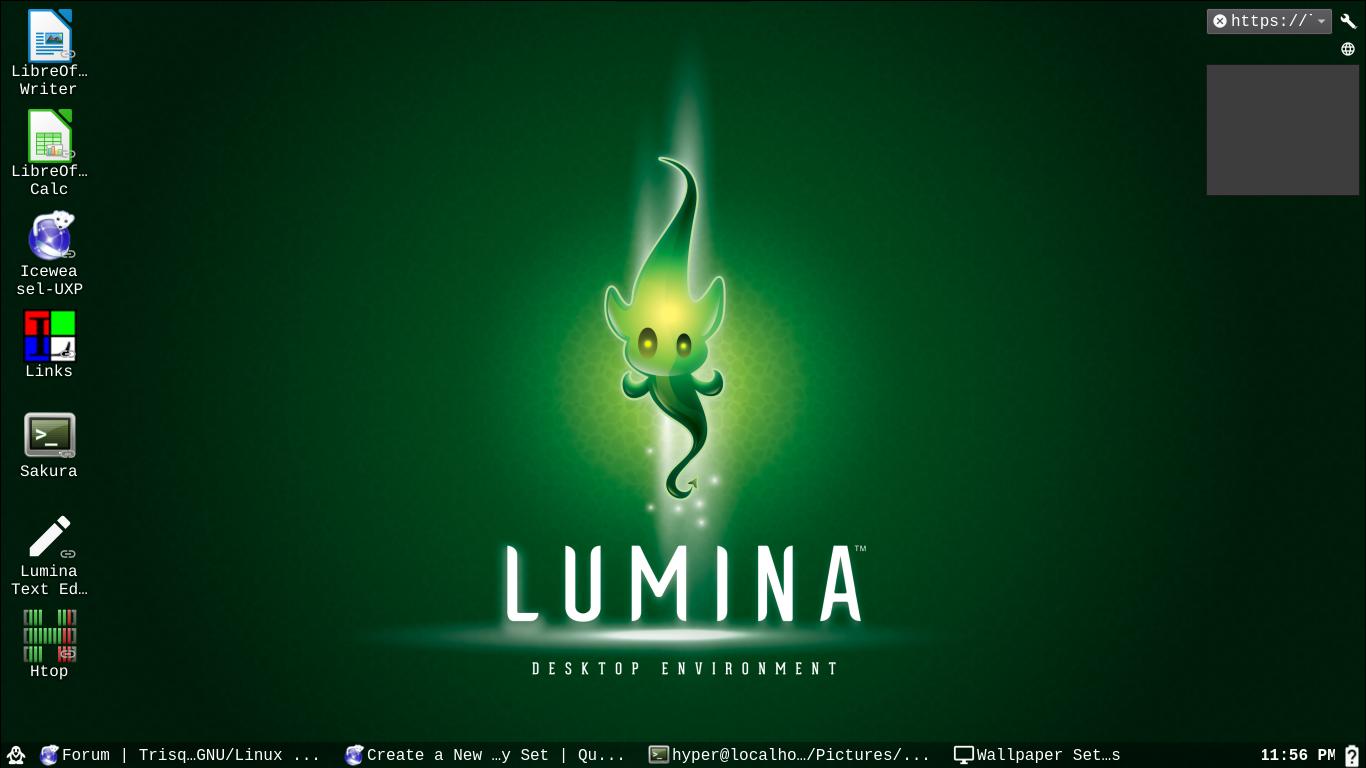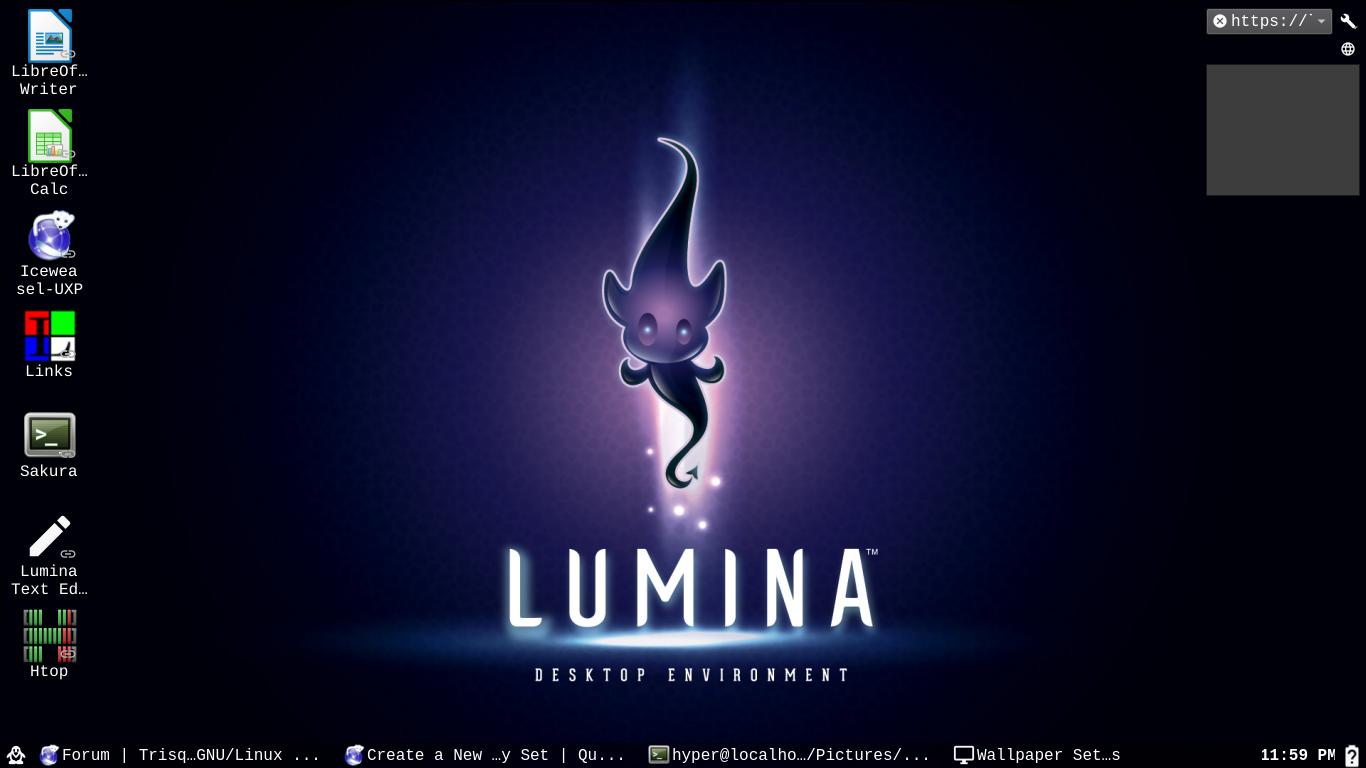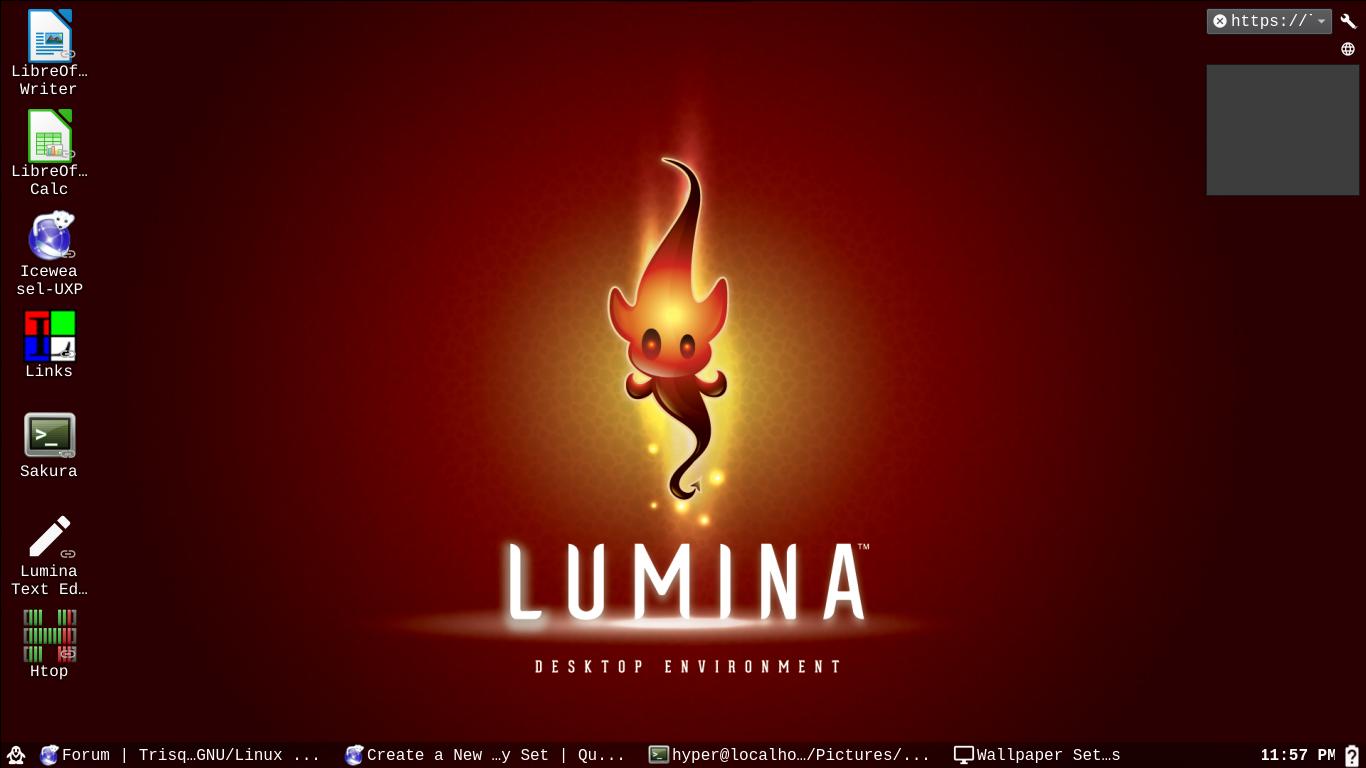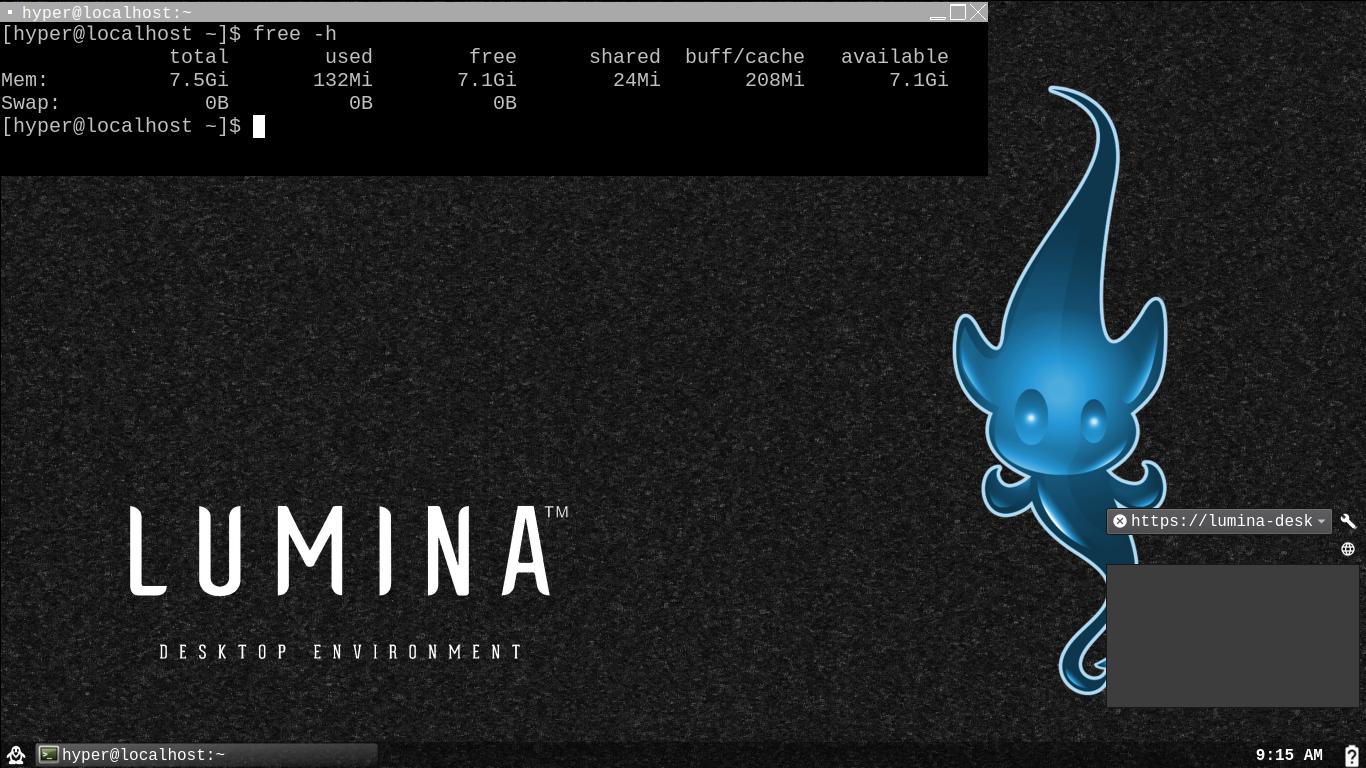You are not logged in.
- Topics: Active | Unanswered
#176 Re: Off-topic » Show your desktop (rebooted) » 2021-12-10 01:39:09
Ceres and Void Linux coexisting with the help of Bedrock. Uncluttered xfce desktop.
#177 Re: Off-topic » Ode to HoaS (and Sid) » 2021-12-08 21:58:13
Isn't Sid gorgeous? And yes, she is so named because she is unstable
She's lovely for a cat-god-empress-of-the-world.
Not quite on the same level as my Nancy and Trudy though.
#178 Re: Off-topic » Ode to HoaS (and Sid) » 2021-12-08 17:47:44
EDIT: and what makes you think I identify as male?
Pretty clear that you identify as cat-god-emperor-of-the-world.
#179 Re: Devuan Derivatives » JWM KIT love fest » 2021-12-02 02:36:34
I found a new method for web browser stuff for Hyperbola, its called badwolf + hblock!
https://github.com/hectorm/hblock
I modified /etc/hosts and use it to block as many ads as possible...
I should add, you can modify hblock to add or remove filterlists as long as they are in raw format.
Hope this helps someone who wants to escape the bs of modern web browsers.
Wow, this is fantastic zapper! Takes all the manual labor out of constantly updating those adblock files. Awesome, thanks!
#180 Re: Installation » How to have updated firefox-esr in Chimaera? » 2021-11-29 14:21:12
please share the link you used as FF want to give me the .tar.gz and not the .deb!
Mozilla puts its .deb files for Firefox-esr in a ppa on launchpad: https://launchpad.net/~mozillateam/+archive/ubuntu/ppa
You can just grab an individual .deb file for Ubuntu 20.04 or 21.04 - should work fine on Devuan. Click "View Package Details" and select a version to try. The main .deb file will be a roughly ~50mb file (or more) for that version that will probably be at the bottom of the version's web page. The rest are language packs and debug symbols.
I wouldn't recommend adding the ppa to your sources, since they do tend to introduce a bunch of Ubuntu-only files as well. But the individual .deb files are all there and should work fine as a stop-gap until Debian's next version is available. Or until you see the light and add Bedrock Linux to your system to access the Ceres .deb files.
#181 Re: Installation » [SOLVED] devuan 4 - protonvpn » 2021-11-17 22:19:49
@andyprough i have a account with protonvpn,
there i login, and go to "downloads" where it lets me choose to download or the apps or the .openvpn config files ; after downloaded the proper one, can add it to network manager;
is not so elegant, as it would not let me choose another country or another channel if the server is full, but for my needs it is enough.
Nice! I live in a country with some of the world's worst privacy laws and government spying on citizens, so the ability to access a foreign server is pretty crucial. But it's good to know about the option. Thanks!
#182 Re: Off-topic » Show your desktop (rebooted) » 2021-11-17 14:55:38
andy, you cant really compare the progress of Devuan to hyperbola. I do understand where you are coming from and respect that hyperbola have talented people coding there, but im just pessimistic in regards to forking openbsd to hyperbola.
I don't know, I'm just a hack Devuan user that's doing some distro-hopping for fun. They are sending new packages to their repo at a pretty quick pace right now. They are not just a random tiny group of developers - they are an FSF approved fully libre distro, and a subproject under Arch. They probably have access to some money and resources and a dedicated dev and user base. 
#183 Re: Off-topic » Show your desktop (rebooted) » 2021-11-17 14:35:27
That is not what i read when it was announced. I dont have any sources but im fairly certain they indicated late 2021 they would have something alpha.
I do not know what you read either, but here we are.
#184 Re: Off-topic » Show your desktop (rebooted) » 2021-11-17 14:31:32
I predict hyperbola possibly going sunset like trident has blackhole.
It's what people outside the Devuan community have been saying about Devuan since its inception. Obviously all such predictions are totally true and reliable. Oddly, Hyperbola and Devuan are both seeing a high amount of development activity. Never got the message that their projects are supposed to be long dead by now.
#185 Re: Off-topic » Show your desktop (rebooted) » 2021-11-17 14:08:43
This was the "Hyperbola BSD" people. Development seems to have stalled
And you would be 100% incorrect in that assessment. This is Hyperbola GNU/Linux 0.4 testing. Hyperbola BSD is a different beast altogether which is only in the planning stages, and which you will not see for several years.
It's the kernel which makes it Linux or BSD, you see. Not the borrowing of sound or graphics stack pieces.
#186 Re: Off-topic » Show your desktop (rebooted) » 2021-11-16 15:28:26
How about htop? Which user does that show owns X?
Anyway, back on topic with my Debian bullseye sway desktop
"X" is owned by root if I plug it into your ps command.
I thought gnome 40-whatever was the love of your life? You won't make it into fanboi Valhalla at this rate.
#187 Re: Off-topic » Show your desktop (rebooted) » 2021-11-15 18:44:57
EDIT: trying to answer myself but their live image is console only. And it uses haveged, which is a stupid decision and makes me worry about their competence.
There once was a distro that was savaged,
For generating its randoms with haveged,
Said head-on-a-stick,
This entropy's not thick,
But would make a fine stew if it were cabbaged.
Edit: Back at my desk, so I can try and answer your questions. Your 'ps' command did not produce any output for me, either as root or as normal user.
I do not have haveged installed. It's in the repos, but it's also in the Arch and Debian repos, so that doesn't mean much. Are you talking about the live image compression?
If you downloaded a live image, it would have been from the 0.3.1 version. Hyperbola 0.4 is a radical makeover, and I haven't seen a live image for it yet. The 0.3.1 version still includes regular xorg, dbus, polkit, normal desktops and browsers, etc. If you want to torture 0.4 (or let it torture you), I wrote some how-to threads giving my steps on installing 0.3.1 and then upgrading to 0.4:
https://trisquel.info/en/forum/hyperbol … ow-manager
https://trisquel.info/en/forum/hyperbol … ng-04-beta
#188 Re: Off-topic » Show your desktop (rebooted) » 2021-11-15 16:09:42
Lumina desktop on a Hyperbola 0.4 testing install. Hyperbola 0.4 is very interesting - no systemd, no dbus, no polkit, no elogind, no pulseaudio, no networkmanager. Uses the openBSD "xenocara" version of xorg, the openBSD "doas" version of sudo, and the openBSD "sndio" sound server. Uses runit.
Hyperbola 0.4 does not have xfce, mate, kde, gnome. No lxde or lxqt. Looks like Lumina is the only desktop environment. There are a lot of window managers to choose from. The web browser is called iceweasel-uxp, a Hyperbola fork of palemoon's "basilisk" web browser. Other major browsers won't install, as they require dbus. iceweasel-uxp can pretty much handle everything on the web though. Many of the terminal emulators I would normally use aren't available as they require dbus, so I've found a nifty one to use called 'sakura' which seems to do all that I need.
Everything works, although you do have to teach yourself some tricks. For example, sound works if you start your application with the correct sndio options. Networking is a manual command-line setup on each reboot, although I've got it down to 3 easy commands now. There's probably an automatic way to set up networking, but I haven't researched it yet.
I've been using Hyperbola with DWM for a few weeks now. Today is my first day to try out Lumina.
#189 Re: Installation » [SOLVED] devuan 4 - protonvpn » 2021-11-14 04:45:42
just ran into the same problem,
but i resorted a different path,
and downloaded the .openvpn config files for the free servers in US and JP
and just added those to create "VPN Connections" in the Network Manager; is quite elegant, i think, works beautifully and easy in XFCE4
Write down the steps you took to do this please. I'd like to try it myself, but I don't completely follow what you are saying you did. For example, where did you find those .openvpn config files for those servers? And how did you get signed into the service? And how do you control the kill switch?
#190 Re: Off-topic » Show your desktop (rebooted) » 2021-11-12 19:36:48
@andyprough & @GlennW — thank you very much for the information but this does what I want:
# mkdir -p /etc/systemd/system-preset # tee /etc/systemd/system-preset/99-default.preset <<<'disable *'^ That stops all systemd services from being enabled automatically by APT when packages are installed.
You should spend a little bit of time on the Trisquel forum. A lot of really fun folks who think a lot like you and where this systemd info would be very useful. Not a bunch of rules and mods like on MX or on FDN.
#191 Re: Off-topic » Show your desktop (rebooted) » 2021-11-12 04:50:35
MiyoLinux wrote:Arch is bloat!
Quoted for truth. I really wish they wouldn't compile everything with --enable-kitchen-sink but that's how it works with Arch...
EDIT: but they make up for it by not enabling services by default when they're installed. I think there's a way to set that with De{vu,bi}an but I can't remember how. Anybody?
Debian wiki says "If you want to change the default behaviour of starting up services on installation of their associated packages[5] use policy-rc.d, please read /usr/share/doc/sysv-rc/README.policy-rc.d.gz for more information."
I think you do something like the following, but not certain:
nano /usr/sbin/policy-rc.dfile contents:
#!bin/sh
exit 101then:
chmod +x /usr/sbin/policy-rc.d
dpkg-divert --local --rename --add /sbin/initctl
ln -s /bin/true /sbin/initctlSomething like that?
However, I don't know if this is a complete solution, as policy-rc.d is supposedly ignored on reboot. Possibly the intictl linking at the end will help with that. Here's a good discussion of how policy-rc.d works:
Install Debian Package without Automatically Starting Daemons, https://weicode.wordpress.com/2016/02/1 … g-daemons/
Obligatory WARNING to any random readers - DO NOT ATTEMPT THIS IF YOU DON'T KNOW ALL ABOUT WHAT YOU ARE DOING. It WILL most definitely be able to brick your system.
#192 Re: Devuan Derivatives » JWM KIT love fest » 2021-11-08 04:27:57
Andyprough can correct me if he wants, but I think he said it used like somewhere from 60-70 megabytes to use it, even with jwmkit.
On a minimal Hyperbola install, I can start JWM with just 69mb of memory used, per the 'free -h' command. That's not with JWM Kit, but when I've used JWM Kit I've noticed it needs very little memory.
#193 Re: Other Issues » [SOLVED] ungoogled-chromium, Iridium, or LibreWolf, please » 2021-11-06 17:47:05
Did you manage to get ublock origin to work?
I had ungoogled chromium working but using the latest releases from ublock github were not working for me.
The chrome webstore will not let you install any addons through the ungoogled browser that im aware of.
Re: ublock - I'm not using it right now on ungoogled-chromium - I'm using noscript and it's blocking ads fine.
There's apparently some chromium build problem with respect to ublock and other dedicated ad blockers right now: https://github.com/Eloston/ungoogled-ch … ssues/1698
Devs are apparently working on a fix.
To use the chrome web store, use the instructions on this page: https://avoidthehack.com/manually-insta … d-chromium
#194 Re: Other Issues » [SOLVED] ungoogled-chromium, Iridium, or LibreWolf, please » 2021-11-05 21:47:45
Oops, sorry for the misinformation. I really should have checked that. Thanks for the correction Andy.
I was of the same opinion up until about a week ago, as ungoogled-chromium used to be horribly out of date. But recently they've added special deb repos on their github page and I had been trying it out on Devuan and Trisquel. Seems to work well, and pretty much up to date. The deb repos are running about a week behind, but not too bad.
It's good for chromium to have a bit of competition. Too often it is released in a semi-broken state. ungoogled-chromium can pick up a lot of users if they can stay current and release a version that mostly works well.
#195 Re: Other Issues » [SOLVED] ungoogled-chromium, Iridium, or LibreWolf, please » 2021-11-05 13:41:58
But for the "un-Googled" versions you list the situation is even worse because they're all based on outdated versions of Chrome. Privacy might be better than Chrome but security for those browsers is a complete joke (IMO).
The current version of ungoogled-chromium (95.0.4638.69) is the exact same as the current Arch version of chromium. It was released by the chocolate factory on Sept. 29th. Repology shows that 95.0.4638.69 is considered the "newest" release.
That's vastly better than Debian, which is rolling with the 90.0.4430.212 version of chromium right now. That version was released back in April or May.
#196 Re: Off-topic » Show your desktop (rebooted) » 2021-11-04 18:57:06
Shoot me whatever you want because of SystemD
Yesterday upgraded from Fedora 34 to 35.
Oooh. How edgy. Imagine if you did something really dramatic, like installing Ubuntu.
#197 Re: Other Issues » [SOLVED] ungoogled-chromium, Iridium, or LibreWolf, please » 2021-11-02 23:26:28
@andyprough
Except for the unscrupulous owners of exit nodes.
That would be the NSA, who already has backdoors into your email, your cell phone, your ISP, your DNS provider, your router, your security cameras, your car, your doorbell, your thermostat, and your refrigerator. Good luck keeping secrets from them due to your choice of web browsers. Tor over VPN is one method that might work for you, although most of the VPN's appear to be compromised as well. But if you find a good VPN that actually keeps its promises, you could probably pull it off.
However, from a purely technical perspective, Tor Browser is far and away the vastly superior privacy browsing experience in terms of being nearly impossible to track via fingerprinting. The scholarly research into that question is pretty much unanimous.
Next most private is Brave. Once again, the recent scholarly research and the testing is pretty much all in agreement. So if you want a non-Tor privacy browser, add the brave repo and install brave and set your anti-fingerprinting setting to "strict" and your anti-tracking level to "strict" in the settings.
#198 Re: Installation » How to have updated firefox-esr in Chimaera? » 2021-11-02 21:52:13
If that package is installed from testing then you need to restore your system from the backup you made before you broke it by adding ceres sources.
You make outstanding arguments in favor of Bedrock, far better than anything I've ever stated.
#199 Re: Other Issues » [SOLVED] ungoogled-chromium, Iridium, or LibreWolf, please » 2021-11-02 18:17:43
Would it be possible to have a privacy-respecting Chromium spin, e.g., ungoogled-chromium, Iridium, or LibreWolf, in the package libraries? All of these currently require compilation and/or are based on Debian Unstable.
Tor Browser is by far the most privacy respecting and is in the repos:
sudo apt install torbrowser-launcher#200 Re: Installation » How to have updated firefox-esr in Chimaera? » 2021-10-25 00:16:13
No dependencies and works fine. Excellent.
Agreed - no new dependencies is one of the big advantages. Enjoy.

